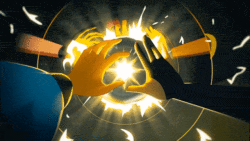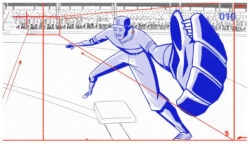The emerging master of virtual reality storytelling, Saschka Unseld, is back again. As always, he delivers practical insights for the evolving art form of real-time storytelling, gleaned from his experience as the creative director of Oculus Story Studio.
So far, the studio has released two short form experiences, Lost and Henry. The latter was intended to be a comedy, but as Unseld explains, it was difficult to keep if from being a tragedy:
With Henry, for example what we did, we thought, “Okay, let’s try to tell a comedy — typical slapstick kind of animated character comedy.”
The final film turned out to be more sad than funny. If you would cut it as a film, exactly the same thing, you would have a lot of laughs. But in VR, you don’t. If someone falls on their face right next to you, it’s not funny.
In cinema. you have something like the fourth wall, which means there is this wall between the story and the world and the audience. In VR, there is no such thing as a fourth wall, because in VR you are right there with the characters in the world.
It might seem counterintuitive, but what Unseld is saying is that literal and figurative distance is what enables our emotional reaction to characters in cinematic experiences. The intimacy of VR creates new challenges for certain kinds of emotional storytelling. We must find ways to observe while also being “in” the scene.
The unstated implications of this are profound. VR almost forces an empathic response to a character’s situation. In film, that empathy is the highest goal — and achieving it is usually the result of masterful direction. In VR, though, there are times when empathy must be dialed back in order to achieve a desired reaction.
Building vs editing
Also, it’s worth noting that Unseld uses the word “build” instead of “cut” or “edit” when describing an earlier version of Henry: “We had an early build of Henry, when Henry never looked at you,” he says.
“Build” is a software development term roughly equating to a version. I point this out because what Oculus Story Studio is doing is creating real-time experiences that are just as much software-driven as they are story driven. They are not, in other words, editing a film and hitting a render button.
As I’ve argued earlier, this seemingly small distinction is crucial. It means that every viewer has a different experience of a project, one shaped by their own curiosity and sense of pacing. The experiences react to the viewer — and vice versa — forming an emotional feedback loop that is radically different than traditional filmmaking.




